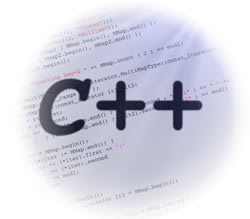Difference between C++ and Java
Key difference: C++ is a general-purpose programming language, which is developed from the originally C programming language. It was developed by Bjarne Stroustrup at Bell Labs starting in 1979. C++ was originally named C with Classes. It was renamed C++ in 1983. Java is another programming language, which has been influenced by the C language. It derives much of its syntax from C and C++, however it has fewer low-level facilities than either. Java is a general-purpose programming language that is designed to have fewer implementation dependencies as compared to previous languages.
 C++ and Java are two different computer programming languages. C++ is another general-purpose programming language. It is developed from the original C programming language. It was developed by Bjarne Stroustrup at Bell Labs starting in 1979. C++ was originally named C with Classes. It was renamed C++ in 1983.
C++ and Java are two different computer programming languages. C++ is another general-purpose programming language. It is developed from the original C programming language. It was developed by Bjarne Stroustrup at Bell Labs starting in 1979. C++ was originally named C with Classes. It was renamed C++ in 1983.
C++ is a statically typed, free-form, multi-paradigm and a compiled programming language. The C++ programming language is widely considered to be an intermediate-level language, as it made up of both high-level and low-level language features. As compared to C, C++ incorporates object oriented features, such as classes, and other enhancements.
C++ has taken over some of the popularity of the C language. C++ is now currently implemented on a wide variety of hardware and operating system platforms. It is considered to be an efficient compiler to native code. It also incorporates systems software, application software, device drivers, embedded software, high-performance server and client applications as part of its application domains, as well as entertainment software such as video games.
C++ originally started out as an enhancement to C. It was designed to be source-and-link compatible with C. It added classes, virtual functions, operator overloading, multiple inheritance, templates, exception handling, etc. However, it eventually developed enough to be considered a programming language in its own right. It was originally ratified in 1998 as ISO/IEC 14882:1998.
C++ is now commonly used for hardware design. The design is first described in C++. It is then analyzed, architecturally constrained, and scheduled to create a register-transfer level hardware description language. It would do this through high-level synthesis.
Both free and proprietary C++ compiler software is available in the market. Some examples of these software include the GNU Project, Microsoft, Intel and Embarcadero Technologies. C++ has also had a major influence on other programming languages such as C# (C Sharp) and Java.
.jpg) Java is another programming language, which has been influenced by the C language. It derives much of its syntax from C and C++, however it has fewer low-level facilities than either. Java is a general-purpose programming language that is designed to have fewer implementation dependencies as compared to previous languages. It is concurrent, class-based, and an object-oriented language.
Java is another programming language, which has been influenced by the C language. It derives much of its syntax from C and C++, however it has fewer low-level facilities than either. Java is a general-purpose programming language that is designed to have fewer implementation dependencies as compared to previous languages. It is concurrent, class-based, and an object-oriented language.
Java was developed by James Gosling at Sun Microsystems and was released in 1995. It was originally released as a core component of Sun Microsystems' Java platform. Sun has since re-licensed most of its Java technologies under the GNU General Public License. This means that all the technology licensed under GNU General Public License is open source and generally available free of cost. Sun Microsystems eventually merged into Oracle Corporation.
Java is designed to allow the same code to run on various platforms. i.e., developers are allowed to “write once, run anywhere” (WORA). Hence, Java applications are typically compiled to bytecode. A class file which contains a Java bytecode can then be run on any Java Virtual Machine (JVM). This would be regardless of computer architecture.
As of 2012, Java has become one of the most popular programming languages for use. This is especially true for client-server web applications. Many other systems have developed alternative implementations of Sun technologies, such as GNU Compiler for Java and GNU Classpath.
C++ and Java originate from the same point, i.e. the C language. However, they have difference design goals. C++ was originally designed for systems and applications programming, whereas Java was created initially as an interpreter for printing systems. Java eventually grew to support network computing.
Some major differences between C++ and JAVA include:
- C++ was originally designed for systems and applications programming, whereas Java was created initially as an interpreter for printing systems.
- Java’s main functionality is Platform Independence, Digital Signatures can be used.
- Unlike C++, Java does not support pointers, multiple inheritance, global variables, templates or classes.
- C++ supports multiple inheritance, whereas Java doesn’t.
- C++ uses pointers and has memory leaks , whereas Java doesn't.
- C++ includes operator overloading and user-defined casts.
- Java has replaced the destructor function with a finalise function.
- C++ compiles to machine language, when Java compiles to byte code.
Image Courtesy: ocoudert.com, sellmic.com









Add new comment